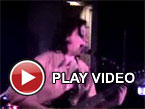Klara Lewis and Nik Colk Void, "Full-On"
 As Alter's album description insightfully observes, a collaboration between these two Editions Mego alumnae "somehow seemed inevitable," yet I was still pleasantly surprised at how seamlessly Lewis and Void were able to combine their visions into something that feels both new and wonderful. On one level, the success of this union makes perfect sense, as both artists tend to turn out some of their strongest work in collaborative situations (Carter Tutti Void and Lewis's KLMNOPQ EP with Peder Mannerfelt being prime examples of that phenomenon). However, both artists excel in extremely specific realms that have some limitations: Lewis is exceptionally good at collaging non-musical sounds, while Void seems particularly adept at crafting eccentric noise-damaged techno.
As Alter's album description insightfully observes, a collaboration between these two Editions Mego alumnae "somehow seemed inevitable," yet I was still pleasantly surprised at how seamlessly Lewis and Void were able to combine their visions into something that feels both new and wonderful. On one level, the success of this union makes perfect sense, as both artists tend to turn out some of their strongest work in collaborative situations (Carter Tutti Void and Lewis's KLMNOPQ EP with Peder Mannerfelt being prime examples of that phenomenon). However, both artists excel in extremely specific realms that have some limitations: Lewis is exceptionally good at collaging non-musical sounds, while Void seems particularly adept at crafting eccentric noise-damaged techno.
Obviously, beat-driven sound collages were a distinct possibility, but so were any number of other options, so I had no clear expectations about where this shared vision would ultimately land. Now that said shared vision has landed, however, I can confidently state that Full-On resembles a deeply unconventional beat tape and quite a good one at that. While I suspect some listeners will initially find the album's kaleidoscopic parade of brief loops and vignettes exasperatingly sketchlike (there are a lot of 1-minute songs), I personally warmed to Full-On almost immediately, as practically every piece that made it onto the album is compelling, inventive, and endearingly idiosyncratic.
According to the label, Full-On is billed as a series of "intense miniatures" built from "the process of unadulterated experimentation and whimsical interplay," which feels like an apt enough description to me. Any further generalizations beyond "this is basically an album of extremely cool loops" are hopeless, however, as it is damn near impossible to nail down a rough stylistic niche, identify who is playing, or even identify which instruments are being played (though it is probably safe to assume that any recognizable guitar sounds emanate from Void).
While the duo do provide a rough list of their sound sources (guitars, synths, euro rack modular systems, voice, sampling and outboard processing), the tools used are nearly irrelevant in the face of the extreme transformation that every sound underwent in the aforementioned whimsical interplay. Ingeniously, Lewis and Void treated the composition of the album as something akin to a game of ping pong, constantly challenging each other to take ideas further while also playfully derailing expected paths with teasing curveballs. That probably is not an ideal strategy for composing a conventionally focused and coherent artistic statement, but it does seem to be an ideal strategy for churning out an impressive number of great ideas and for crafting a fun and surprising departure from expected terrain.
A perfect illustration of the latter is "Junk Funk," which sounds like a detuned and lo-fi would-be homage to House of Pain's "Jump Around" (though Lewis and Void wisely restrain themselves from rapping, thankfully). Elsewhere, "Guitar Hero" sounds like a surf guitarist's sound check chopped into stuttering and (eventually) blown-out abstraction, while "Pop" sounds like a hazy and sensuous cloud rap groove looping dreamily into infinity.
On the other end of the spectrum, the opening "Say Why" feels like an excerpt from a killer noise set in which crackling blown-out bass wreckage collides with distorted fragments of melody and visceral slashes of treble violence. "Green" is yet another fine noise detour, as it eerily transforms a voice loop into a relentlessly churning and crunching industrial throb. There are also several pieces that hypnotically delve into more ambient territory, such as the shimmering backwards melody of "Teeth," the warm drones and echoing scrapes of "Found," or the sublime warmth of "Travel With Friend" and "To Hold" (though the latter's bliss is repeatedly threatened by a murky undercurrent). Additionally, there are some wonderful outliers that do not resemble much else on the album. "Swimming," for example, sounds like it could be a two-second sample of an Arthur Russell cello melody looped and stretched into lazily churning ambient beauty with a slowed-down train rhythm. I was also quite captivated by "Ski," which relentlessly loops a descending Turkish-sounding melody into increasingly jumbled and pitch-shifted mindfuckery, though I think I love the loop more than the piece itself. That brings up an interesting feature of Full-on: I cannot stop wondering what other directions these pieces might have taken or what might have resulted had any of them been expanded into something more substantial.
Naturally, If the album were less uniformly delightful, such thoughts would mostly be of the "ugh-what a missed opportunity" variety, but in this case they are more akin to experiencing a great film that ends with a cliffhanger: I love this album, but I also feel like this creative partnership is a long way from running its course.



